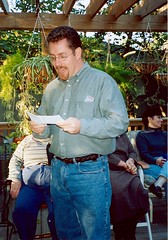Community Info and the Digital Nation
I recently finished Anthony Wilhelm's Digital Nation ... the basic premise is that as we move to a more digitally connected society, we need to remember that many folks are without the skills for and/or access to technology necessary for participation. Dr. Wilhelm mentioned more than once that by pushing more services online we -- as governments, libraries and schools -- are creating an environment of depreciative value to those individuals who can get the services nowhere else.
Obviously, libraries -- specifically public libraries -- have the ability to help deal with both of these issues. At Johnson County Library (JCL), we have 350+ publicly accessible PCs for patron use. In addition, we offer training on basic PC and Internet use. One of the things that we've talked about and planned for (but not actually implemented) is providing more focused training at the library for county, state, and even federal services that can only been be accessed online.
Unfortunately, JCL is no different than many organizations -- we simply are not aligned or prepared to deliver training or other related content like this. Wilhelm comments: "Parachuting information and communications technologies into these environments without addressing underlying issues of organizational readiness, continuous professional development, and infrastructure would be precipitous." (Digital Nation, p.97).
The challenge will be to assess the real needs of the community and apply what we learn so that the realignment can happen. It'll be difficult, because the folks that we have who provide more traditional library services do not have the talents, experiences, or interests to be able to deliver the new services. But it won't be impossible ...
Our first step has been to create a Web Content Team. Their job is to assess, plan for, and develop content for the library's sites. When I say "develop," I mean create, write, and negotiate for content that people want access to. The specific focus of all of our content is localness, so the latter statement (negotiate for content) comes down to working with local agencies and organizations to get access to their stuff so that we can make it available.
The Content Team's focus matches up well with the whole training concern. If we want people to use the content, we should market it and train people how to use it via our sites. But, realignment of resources is what will make it possible.


0 Comments:
Post a Comment
<< Home